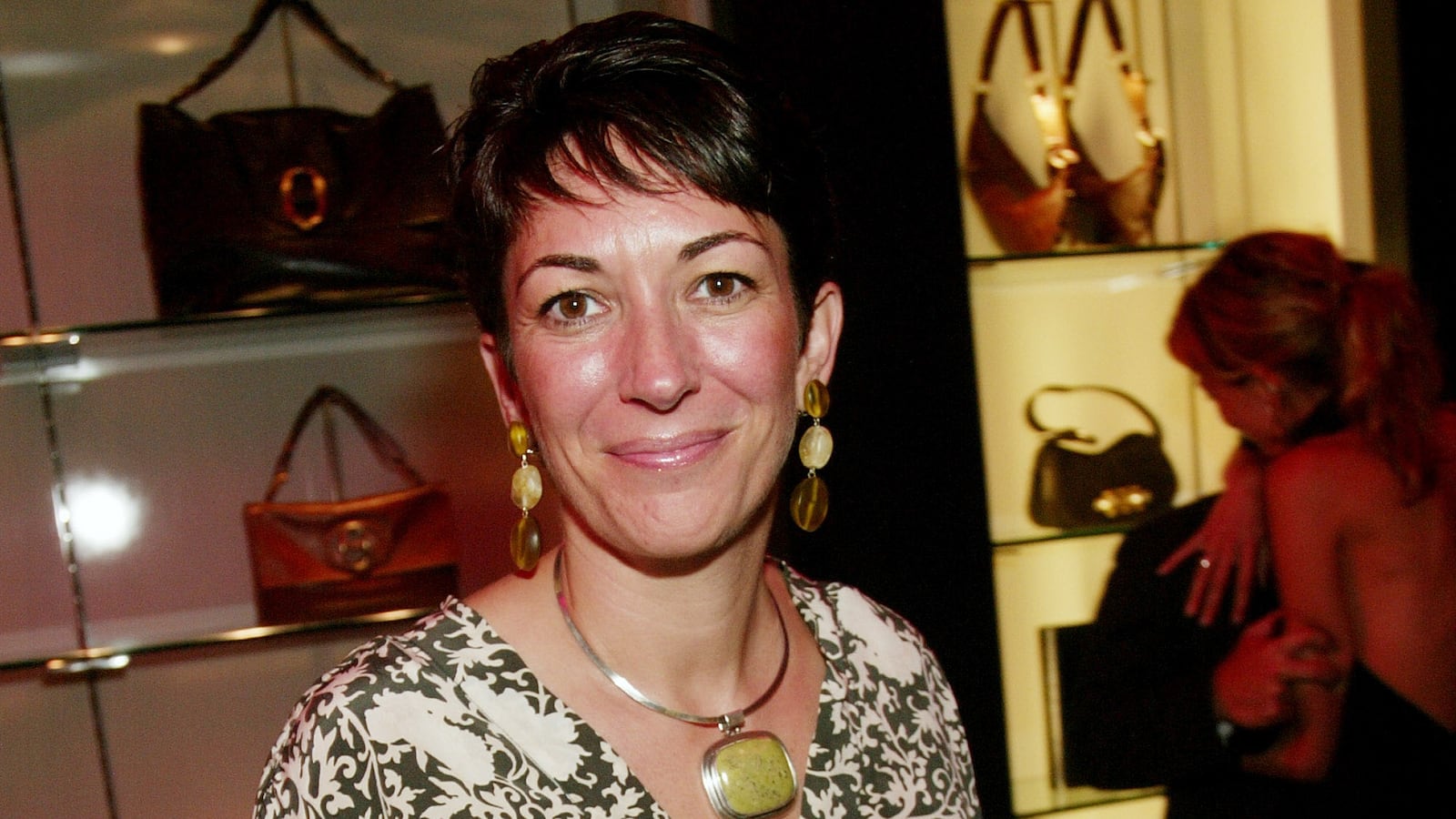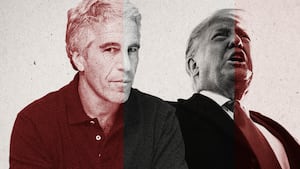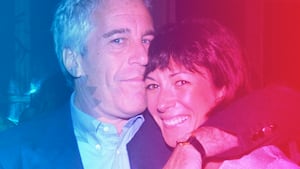A juror in Ghislaine Maxwell’s sex-trafficking trial was questioned under oath on Tuesday about why he didn’t reveal his history of childhood sexual abuse on a jury questionnaire—and about whether it impacted his ability to be impartial in the case.
Manhattan federal judge Alison Nathan also asked Juror 50 about his handful of media interviews shortly after the British socialite's guilty verdict.
“I figured a little article about a juror giving their experience wouldn’t be record-breaking or really in the news at all,” said the juror, who went by his first and middle name Scotty David in the press.
Now Maxwell is fighting for a retrial in wake of Scotty’s January media tour, arguing he never would have made it to the panel had he truthfully answered the 50-question juror form used to weed out potential bias.
The juror was contrite on the stand, saying he never intended to mislead anyone and didn’t lie to get on the jury for the notorious sex-trafficking case. He also testified that his prior experience didn’t impact his ability to fairly evaluate the charges against Maxwell.
“This was one of the biggest mistakes I’ve ever made in my life,” the juror testified.
“If I lied deliberately, I wouldn’t have told a soul,” he later added, and apologized for wasting people’s time and money.
Scotty claimed that he didn’t realize he made an error on the jury form until a Daily Mail reporter peppered him with questions about it in a video interview.
“Did I just mess something up entirely?” the juror recalled thinking. He said he was “shocked” and didn’t know he’d missed a question asking if he was the victim of sexual abuse.
Nathan ordered the prosecution and defense to file briefings on the juror’s testimony as it relates to Maxwell’s request for a new trial by March 15.
Last week, Scotty’s counsel indicated he would invoke his Fifth Amendment right against self-incrimination at the hearing, and prosecutors indicated they were making an application to grant him immunity for his testimony. By Tuesday, the Department of Justice granted that request.
The juror made headlines soon after Maxwell was found guilty.
In late December, Maxwell was convicted of aiding her ex-boyfriend Jeffrey Epstein’s underage sex ring in the 1990s and early 2000s. Four victims took the stand at the high-profile criminal trial and claimed Maxwell groomed them for the multimillionaire predator and sometimes participated in the sexual abuse herself. Jurors deliberated for six days before finding Maxwell guilty on five of six charges related to child sex trafficking.
Days after the verdict, lawyers for the 60-year-old British socialite argued the verdict was in jeopardy because of Scotty’s statements in the press.
The Independent, the first to publish a feature on Scotty, revealed the 35-year-old Manhattanite was himself a survivor of childhood sexual abuse—a fact unknown to the court because he didn’t disclose it on his jury questionnaire. “This verdict is for all the victims,” Scotty told the U.K.-based outlet. “For those who testified, for those who came forward and for those who haven’t come forward. I’m glad that Maxwell has been held accountable.” The publication added that Scotty’s fellow jurors “went dead silent” when he shared he was a victim of sexual abuse and argued that survivors can misremember small details about a traumatic event, but not the whole of a traumatic memory.
“I know what happened when I was sexually abused. I remember the color of the carpet, the walls. Some of it can be replayed like a video,” Scotty told The Independent. “But I can’t remember all the details, there are some things that run together.”
Scotty also granted interviews to the Daily Mail and Reuters, saying he did not recall whether the pre-trial jury questionnaire asked prospective panelists whether they had been victims of sexual assault and that he “flew through” the list of queries. He said that when fellow jurors questioned the accuracy of the accusers’ memories, he swayed some of them by talking about his own experience with sexual abuse.
In court on Tuesday, Nathan warned the juror: “You need to answer my questions today. You need to answer truthfully. If you don't answer truthfully, you could be prosecuted for perjury.”
She also instructed Scotty not to share anything about what jurors discussed in the deliberation room.
After he swore to tell the truth, the juror reviewed Question 48 on the jury questionnaire, which asked if he had been the victim of sexual harassment, abuse or assault. Asked if his answer was accurate, he answered, “No, it is not.” The response should have been yes, he said.
The juror said he was abused when he was 9 and 10 years old but didn’t disclose what happened until high school. He testified that his mother reported the alleged crime to police but no one was charged.
Scotty also addressed Question 25, which asked whether he had ever been the victim of a crime. He had answered no. “Looking back at it now… it's an incorrect answer,” the juror said. He said that at the time, he imagined the question referred to being robbed or mugged. “I wasn't thinking of my sexual abuse,” he added.
The juror later said, “I don’t really think about my abuse much anymore because it doesn't define me.”
The juror then repeated something he told news reporters weeks ago: “I flew through the questionnaire.”
Indeed, Scotty said he never thought he'd be selected for the 12-member jury out of nearly 700 prospective panelists.
When he filled out the questionnaire, he said, he was seated at a table where people dropped off their forms. He said the environment was noisy and “super-distracting” and he “skimmed” the document to get it over with, having waited three hours for an instructional video. A breakup with an ex was also occupying his mind and focus, he said.
“I did not hope to serve on this jury,” he testified. “But if you’re going to serve jury duty it might as well be something that's interesting. But I did not set out to get on this jury.”
The juror clarified later on in the questioning, “This is something interesting. It’s not like... a fraud case [that] might be boring. I just felt like this might be something interesting that keeps my attention.”
He said he felt pressure to complete the jury questionnaire quickly and compared it to taking a test in school; he said he didn't want to be the last one to finish.
When Nathan asked whether the juror approached filling out the form “with diligence,” he answered no.
Nathan also leveled follow-up questions after Scotty said he didn’t tell friends and family about his past abuse, asking why he told the international news media.
“I only used it in order to talk to a reporter about jury deliberations … why I believe a certain way based on all the evidence that was provided during trial,” he said.
He also said that he was inspired by the victims who testified at trial and were “brave enough to give their story.”
“I felt like if they can do it, then so can I.”
On Jan. 5, the prosecution and defense each filed letters with the court about Scotty’s talks with reporters, which raised questions as to whether he was impartial at trial. “While the Court instructed jurors that they were free to discuss their jury service with anyone of their choosing, some of the statements, as related in the media, merit attention by the Court,” wrote the government, which suggested the judge investigate.
Maxwell’s lawyers argued that Scotty’s comments warranted a new trial. “Ms. Maxwell also suggests that all the deliberating jurors will need to be examined, not to impeach the verdict, but to evaluate the Juror’s conduct,” the defense wrote.
On Jan. 19, Maxwell’s team filed a motion for a new trial which argued that Scotty’s false answers on the questionnaire “resulted in a jury that was not fair and impartial, and deprived Ms. Maxwell of her constitutional right to trial by jury.” Had he truthfully filled out the form, they argued, he would have been excluded from the panel.
But Juror 50 may not have been alone in allegedly glossing over certain questions.
The New York Times interviewed a second juror, who said that they’d experienced childhood sexual abuse but didn’t say so on the questionnaire. “This juror, who requested anonymity, said that they, too, had discussed the experience during deliberations and that the revelation had appeared to help shape the jury’s discussions,” the Times reported.
“To date, this juror has not publicly revealed their identity, and Ms. Maxwell does not know who it is,” the heiress’ attorneys wrote in their motion.
“For its part, this Court expressed ‘confidence’ that its voir dire process would ‘smoke out’ a juror who was dishonest,” they added. “Ms. Maxwell relied on the Court’s process. And the Court and the parties relied on the presumption to which everyone is entitled: that potential jurors would carefully and honestly engage in voir dire.
“Unfortunately, we now know that Juror No. 50 (and at least one other juror) did not honor their obligations to give ‘only truthful answers.’”
While Nathan denied Maxwell’s initial request for a retrial and to question the other jurors, she did agree to question Scotty at a special hearing.
“To be clear, the potential impropriety is not that someone with a history of sexual abuse may have served on the jury,” Nathan wrote in her ruling. “Rather, it is the potential failure to respond truthfully to questions during the jury selection process that asked for that material information so that any potential bias could be explored.”








